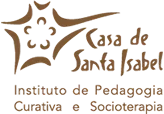Sobre Nós
A Casa de Santa Isabel, em São Romão, Seia, é uma comunidade terapêutica fundada em 1981, que apoia jovens e adultos com capacidades especiais. Através do convívio, aprendizagem e espírito de partilha, busca-se a realização do potencial de cada indivíduo. Oferece atividades ocupacionais e profissionais, complementadas por momentos culturais e desportivos, criando um ambiente familiar e curativo. A Casa valoriza a sustentabilidade, praticando agricultura biológica, reflorestação, reciclagem e uso consciente dos recursos naturais.
Sustentabilidade na Casa de Santa Isabel
Valorizamos a sustentabilidade, adotando práticas que contribuem para a preservação do ambiente. Através da agricultura biológica, a instituição promove a produção responsável de alimentos, enquanto a reflorestação ajuda a recuperar e proteger os ecossistemas locais. Além disso, a Casa pratica a reciclagem e incentiva o uso consciente dos recursos naturais, criando um impacto positivo no meio ambiente e educando os seus membros para a importância da sustentabilidade.
Imagem
Missão
Partilhar e desenvolver capacidades, respeitando as diferenças de modo solidário e ético.
Visão
Uma comunidade terapêutica dedicada ao desenvolvimento integral e harmonioso do ser humano.
Valores
Respeito, Partilha, Solidariedade, Ética e Responsabilidade Social: Valores que guiam ações com humanidade e compromisso coletivo.
